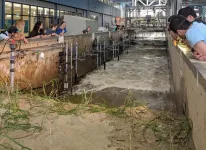(Press-News.org) The chances of surviving massive blood loss from a traumatic injury such as a gunshot wound are around 50 percent. To survive, a patient needs two things to happen quickly: a large infusion of blood and coagulation at the wound to stop the bleeding.
The problem is one of these solutions prevents the other. Introducing a large amount of blood to those suffering a massive hemorrhage impairs the blood’s ability to clot, a condition known as coagulopathy.
Now, Tulane University researchers have uncovered the cause of coagulopathy in trauma victims receiving a blood infusion. They also found that a synthetic compound called dimethyl malonate – often used in perfume manufacturing – has the potential to stop coagulopathy during a massive hemorrhage. The researchers’ findings are part of a new study published in Science Advances.
“Coagulopathy of trauma is a major contributor to mortality, but no treatment has shown to be fully effective,” said Olan Jackson-Weaver, PhD, assistant professor of surgery at Tulane University School of Medicine and corresponding author on the study. “We were getting 60 percent mortality with our animal model. With dimethyl malonate, we got zero percent mortality, and the coagulopathy completely went away.”
Trauma is a leading cause of death in the United States especially for children and young adults as a result gun violence.
Recent studies have shown that coagulopathy during massive hemorrhage treatment is most likely caused by the shedding of the glycocalyx, a barrier of sugars that surrounds and protects cells. In blood vessels, the glycocalyx lines the vessel walls and prevents blood from clotting. However, this is the first study to identify the cellular events that cause the glycocalyx to be ripped apart.
The study found that, during blood loss, a person’s cells lack the oxygen to metabolize succinate, a key part of the cell’s energy-generating cycle. Unable to be metabolized, the succinate builds up. When a large amount of blood is infused into a trauma victim – the succinate is metabolized too quickly, which leads to a change in the structure of the plasma membrane lipids. This exposes the glycocalyx, allows it to be chewed up by enzymes, and mixes the shreds into the bloodstream, where it prevents clotting.
“People have been trying to figure out ways to move the needle a little bit on the death rate from massive hemorrhage for the last 20 or so years and nothing has really worked,” Jackson-Weaver said. “We’re hopeful that understanding these cellular-level events can help to develop something that actually does make a big difference.”
In animal models, dimethyl malonate was effective at inhibiting excessive cellular metabolism, which prevented the glycocalyx from shedding and causing coagulopathy.
But Jackson-Weaver said more research needs to be done to determine if dimethyl malonate is safe for humans or if an equivalent drug that targets cellular metabolism can be developed.
“We’ve established this pathway that causes coagulopathy, so if we can target it therapeutically with a pre-hospital drug or injection, we can hopefully save some lives,” Jackson-Weaver said.
END
Massive hemorrhages are often deadly. Can a perfume ingredient stop the bleed and save lives?
A look at why blood infusions in trauma victims paradoxically prevent blood from clotting and why a common perfume ingredient may help save lives
2023-06-14
ELSE PRESS RELEASES FROM THIS DATE:
Altered gut bacteria may be early sign of Alzheimer’s disease
2023-06-14
People in the earliest stage of Alzheimer’s disease — after brain changes have begun but before cognitive symptoms become apparent — harbor an assortment of bacteria in their intestines that differs from the gut bacteria of healthy people, according to a study by researchers at Washington University School of Medicine in St. Louis.
The findings, published June 14 in Science Translational Medicine, open up the possibility of analyzing the gut bacterial community to identify people at higher risk of developing dementia, and of designing microbiome-altering preventive treatments to stave off cognitive decline.
“We don’t yet know ...
Elimination of type of bacteria suggests treatment for endometriosis
2023-06-14
A research group from the Graduate School of Medicine and iGCORE at Nagoya University in Japan, has discovered that using an antibiotic to target Fusobacterium reduced the formation of lesions associated with endometriosis, a gynecological disorder characterized by endometrial tissue usually found inside the uterus being found outside it. Their findings suggest an alternative treatment for this disorder. The study was published in Science Translational Medicine.
Endometriosis affects one in ten women between the ages of 15 and 49. The disorder can cause lifelong health problems, including pelvic pain and infertility. ...
Newly planted vegetation accelerates dune erosion during extreme storms, research shows
2023-06-14
CORVALLIS, Ore. – Newly planted vegetation on coastal sand dunes can accelerate erosion from extreme waves, a study involving researchers from the Oregon State University College of Engineering suggests.
The authors note the findings run counter to the widely accepted paradigm that vegetation always acts to reduce erosion on dunes, the first line of storm defense for landscapes that are among the world’s most ecologically important and economically valuable.
The experiments involved building beach dune profiles 70 meters long and 4.5 meters high and subjecting ...
Preserving forests to protect deep soil from warming
2023-06-14
A recent study led by scientists at Lawrence Berkeley National Laboratory (Berkeley Lab) and the University of Zurich has revealed that the organic compounds proposed for carbon sequestration in deep soil are highly vulnerable to decomposition under global warming.
The finding has implications for a key strategy in carbon management that relies on soil and forests – natural carbon “sinks” – to mitigate global warming.
About 25 percent of global carbon emissions are captured by forests, grasslands, and rangelands. During photosynthesis, plants store carbon in their cell walls and in the soil. Because ...
Treatment creates steel alloys with superior strength and plasticity
2023-06-14
WEST LAFAYETTE, Ind. — A new treatment tested on a high-quality steel alloy produces extraordinary strength and plasticity, two traits that must typically be balanced rather than combined. Ultra-fine metal grains that the treatment produced in the outermost layer of steel appear to stretch, rotate and then elongate under strain, conferring super-plasticity in a way that Purdue University researchers cannot fully explain.
The researchers treated T-91, a modified steel alloy that is used in nuclear and petrochemical ...
TCT 2023 Program Guide now available
2023-06-14
NEW YORK – June 14, 2023 – The Cardiovascular Research Foundation (CRF) has announced the TCT 2023 Program Guide is now available. TCT is the annual scientific symposium of CRF and the world’s premier educational meeting specializing in interventional cardiovascular medicine. TCT 2023 will take place October 23-26 in San Francisco, California, at the Moscone Center and will celebrate 35 years of leading the field.
Every year, TCT features major medical research breakthroughs and gathers ...
Plate tectonics not required for the emergence of life
2023-06-14
Scientists have taken a journey back in time to unlock the mysteries of Earth’s early history, using tiny mineral crystals called zircons to study plate tectonics billions of years ago. The research sheds light on the conditions that existed in early Earth, revealing a complex interplay between Earth’s crust, core, and the emergence of life.
Plate tectonics allows heat from Earth’s interior to escape to the surface, forming continents and other geological features necessary for life to emerge. Accordingly, “there has been the assumption that plate tectonics is necessary for life,” says John Tarduno, who teaches in the Department ...
Novel research shows older breast cancer survivors experience accelerated aging, worse functional outcomes
2023-06-14
For Immediate Release
Contact
Colleen McDonald
Sr. Consultant, Earned Media - MCW
414.801.3146 | cmcdonald@mcw.edu
Milwaukee, Wis., June 14, 2023 – In a new multi-center study, researchers from the Medical College of Wisconsin (MCW) joined with leading cancer centers from across the nation to examine whether cancer and its treatments accelerate aging. Using novel epigenetic measures to assess biological aging, investigators found that older breast cancer survivors – particularly those exposed to chemotherapy – showed greater epigenetic aging than their same-aged peers without cancer, which ...
The life below our feet: team discovers microbes thriving in groundwater and producing oxygen in the dark
2023-06-14
WOODS HOLE, Mass. – Nearly a third of Earth’s freshwater resources lie in groundwater – much more than in all lakes, rivers and the atmosphere combined, and exceeded only by the frozen water in polar ice caps. Accordingly, about half of humankind depends on groundwater as a source of drinking water.
Despite the global occurrence and essential importance of groundwater, however, knowledge of the organisms that inhabit it, and how they survive, remains thin.
A recent investigation led by microbial ecologist Emil Ruff of the Marine Biological Laboratory (MBL) has discovered ...
IEEE Photonics Society in search for Editor-in-Chief
2023-06-14
The IEEE Photonics Society invites applications and nominations for the volunteer position of Editor-in-Chief (EiC) for the IEEE Photonics Journal, delivered through IEEE’s research digital library IEEE Xplore. The term for the current EiC will end this year and the Society is conducting an open search for potential candidates.
“The IEEE Photonics Journal led the way for the IEEE, being the IEEE’s first open access journal. We’re excited to find a candidate who can lead this pioneering journal for the next term, and I encourage all qualified ...
LAST 30 PRESS RELEASES:
Increasing the number of coronary interventions in patients with acute myocardial infarction does not appear to reduce death rates
Tackling uplift resistance in tall infrastructures sustainably
Novel wireless origami-inspired smart cushioning device for safer logistics
Hidden genetic mismatch, which triples the risk of a life-threatening immune attack after cord blood transplantation
Physical function is a crucial predictor of survival after heart failure
Striking genomic architecture discovered in embryonic reproductive cells before they start developing into sperm and eggs
Screening improves early detection of colorectal cancer
New data on spontaneous coronary artery dissection (SCAD) – a common cause of heart attacks in younger women
How root growth is stimulated by nitrate: Researchers decipher signalling chain
Scientists reveal our best- and worst-case scenarios for a warming Antarctica
Cleaner fish show intelligence typical of mammals
AABNet and partners launch landmark guide on the conservation of African livestock genetic resources and sustainable breeding strategies
Produce hydrogen and oxygen simultaneously from a single atom! Achieve carbon neutrality with an 'All-in-one' single-atom water electrolysis catalyst
Sleep loss linked to higher atrial fibrillation risk in working-age adults
Visible light-driven deracemization of α-aryl ketones synergistically catalyzed by thiophenols and chiral phosphoric acid
Most AI bots lack basic safety disclosures, study finds
How competitive gaming on discord fosters social connections
CU Anschutz School of Medicine receives best ranking in NIH funding in 20 years
Mayo Clinic opens patient information office in Cayman Islands
Phonon lasers unlock ultrabroadband acoustic frequency combs
Babies with an increased likelihood of autism may struggle to settle into deep, restorative sleep, according to a new study from the University of East Anglia.
National Reactor Innovation Center opens Molten Salt Thermophysical Examination Capability at INL
International Progressive MS Alliance awards €6.9 million to three studies researching therapies to address common symptoms of progressive MS
Can your soil’s color predict its health?
Biochar nanomaterials could transform medicine, energy, and climate solutions
Turning waste into power: scientists convert discarded phone batteries and industrial lignin into high-performance sodium battery materials
PhD student maps mysterious upper atmosphere of Uranus for the first time
Idaho National Laboratory to accelerate nuclear energy deployment with NVIDIA AI through the Genesis Mission
Blood test could help guide treatment decisions in germ cell tumors
New ‘scimitar-crested’ Spinosaurus species discovered in the central Sahara
[Press-News.org] Massive hemorrhages are often deadly. Can a perfume ingredient stop the bleed and save lives?A look at why blood infusions in trauma victims paradoxically prevent blood from clotting and why a common perfume ingredient may help save lives





